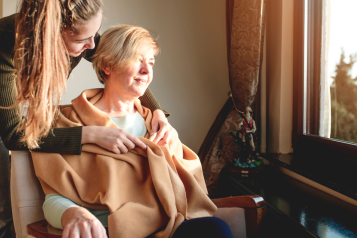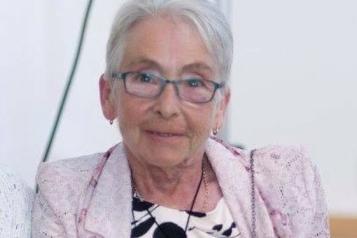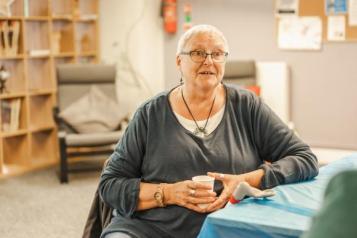What do dying people and their families want from end-of-life care?

A recent report commissioned by Marie Curie highlights that 90% of people who die each year could benefit from end-of-life care.
However, access to and quality of this care is variable, with people reporting long waits for referral, understaffed teams, and a lack of advanced care planning.
End-of-life care is currently under scrutiny as parliamentarians debate proposed legislation on assisted dying and the creation of a Commission on Palliative and End-of-Life Care. We therefore looked at what people are telling us about the topic.
We've identified four key themes that matter most to dying people and their relatives or carers.
Timely access to end-of-life care
Research by Healthwatch Blackburn with Darwen and Healthwatch Sheffield has found that people want timely access to end-of-life care. This includes being involved in Advanced Care Planning, having conversations with healthcare professionals, and being referred to palliative care at an early stage.
We heard that referrals to palliative care teams could take a long time (up to six months) and sometimes time out, so people have to be re-referred. When people finally receive palliative care, it could be at a very late stage—days before their death.
People talked about healthcare professionals being unwilling to discuss with the dying person or their relatives the fact that they were dying. This meant that no conversations took place about access to palliative care. Research by Marie Curie has also found that recognising people's palliative care needs was often considered too late.
This was a concern shared by other professionals:
"We are continually told by health professionals that someone is not at the end of life when we request support from them, usually from the district nursing team. Some GPs are excellent and 'on it,' but others are awful. We have had service users literally die whilst we are on the phone begging NHS professionals for input when they have reached the palliative care stage. It's awful, degrading for the person and unfair on all involved, especially the families."
Story from a social care professional shared with Healthwatch England.
People from different ethnic backgrounds or with particular religious beliefs weren't able to access care that was tailored to their needs, for example to be able to die at home and be cared for by family members. In other stories, people described choosing to care for dying relatives themselves because they didn't feel confident that support services could offer culturally appropriate care.
“I know my faith will be considered at home, I do not know if the staff know what this means for me.”
Story shared with Healthwatch Calderdale
Good coordination between different services
Coordination of care is absolutely vital at the end of life as so many health and social care services can be involved. When this works well, dying people are supported to live their final days without pain and worry, surrounded by their loved ones.
Where coordination of end-of-life care breaks down, the brunt of doing the coordination falls on family members who are already struggling to come to terms with their loved one dying:
"Those last two days were very stressful and upsetting. I felt there was no advice on caring for someone who is actively dying. I spent 48 hours being passed between four people, all saying they couldn't help.
In general, each service was great at what they did, but transitioning between them was stressful, and changing circumstances weren't anticipated or responsive. Joining up between health and care was very poor, unresponsive and only possible during office hours. There was no guidance at all on caring for a loved one in the active-dying phase."
Story shared with Healthwatch England.
Rapid and round-the-clock access to pain and symptom control
A component of "a good death" is access to pain relief and symptom control when needed. For example:
"A carer shared how her dad had been supported by the palliative care team at home. The patient and family had a golden telephone number to contact the team about pain relief. Why cannot everyone access a good death with care from this team?"
Story shared with Healthwatch Wakefield.
Negative experiences involved family members having to chase healthcare professionals to get the pain relief their loved ones needed.
"I believe that my mum was not as comfortable as she could have been and experienced discomfort and pain in her last hours. This was down to an understaffed community palliative care team, who, despite being the most caring nurses I have been privileged to meet, could not attend quickly or regularly enough to keep Mum comfortable. The liaison between us, the hospice and the community team was very unsatisfactory - having to leave messages when I desperately needed to speak to a nurse. Calls weren't returned in a timely manner, sometimes not until the following day"
Story shared with Healthwatch England.
We also heard about palliative care teams not being available 24/7. As a result, dying people couldn't get the support around the clock:
"Community access over the evening and weekend is a nightmare. For example, there was an issue with breakthrough pain relief being prescribed only four times per day when it needed to be every two to four hours. But contacting palliative services/111 took over eight hours to sort out. It was infuriating. I can't imagine how people manage without someone to advocate for them."
Story shared with Healthwatch England.
The importance of staff attitudes
Health and social care staff have the power to make a great difference to people’s experience of end-of-life care through the way they communicate with, listen to and support dying people and their close relatives, as research by Healthwatch in West Yorkshire shows.
People wanted health and social care staff to communicate with them fully and with compassion at a stressful and frightening time.
“I am writing this review to express my heartfelt gratitude for Dr X, who has been involved in my mother's care since she was first placed in palliative care. This period has been incredibly challenging for our family, especially after the loss of her husband of over 60 years. Dr X has been a beacon of support during this difficult time. His compassion and expertise have been invaluable, helping us navigate the complexities of her condition with clarity and confidence.”
Story shared with Healthwatch Newham.
Family members expressed gratitude when health and social care providers acknowledged their needs and supported them to be there for their dying relatives. This could include emotional support or practical support such as access to showering facilities and free parking.
“We were allowed to stay in hospital with my husband for his last six days and nights. The palliative care nurse was excellent and kept my husband comfortable. We were given two hearts: my husband held one and I held the other. I still have them - I keep one under his pillow and the other near my heart so we’re always still close. They still help me to cope. The kindness of all the staff was outstanding.”
Story shared with Healthwatch England.
"When my husband was put on end-of-life care, a bed was made up for me by his side; I was fed and given full access to showering facilities, with towels provided. I was assigned a specialist nurse for my needs, who checked on me every day, and I had a contact number outside of that visit if needed. My husband was at all times treated with respect, care and dignity. He was moved to a window bed so he could look out. I have nothing but praise for the stressed and overworked staff."
Story shared with Healthwatch England.
Negative experiences involved a lack of privacy for the dying person, being spoken to or being treated without compassion. As the following story describes, the impact on family members can be intense and long-term:
"My elderly father was admitted following a fall. We travelled urgently to see him. We sat with him on a general medical ward, with just a curtain between us and the rest of the ward. A doctor came to attend to him and pulled back his bedsheets, leaving his genitals exposed in front of us, removed his breathing tube, and left.
“We were beside ourselves with shock at what had happened and went to get nursing attention to help replace the breathing tube. We only achieved that with difficulty due to it being later in the evening. We slept on upright chairs around him overnight in that ward, where the other patients had all heard our distress and alarm at what had happened.
“He eventually died in the morning. It was a horrifying experience compared to the peaceful death of our mother years earlier. Years later, I still feel great emotional pain at what my father experienced."
Story shared with Healthwatch England.
What’s next
We will share this evidence with the Commission for Palliative and End-of-Life Care, which is currently seeking evidence to identify the strengths and shortfalls in the provision of and barriers to access to palliative care.
The parliamentary Health and Social Care Committee of MPs has also asked its expert panel to examine the current state of palliative care in England.
These inquiries, along with debate on the proposed assisted dying legislation, are likely to lead to new recommendations or national plans to improve end-of-life care.
In the meantime, the public can share feedback on end-of-life care or find out how to raise concerns or complaints by contacting their local Healthwatch.


